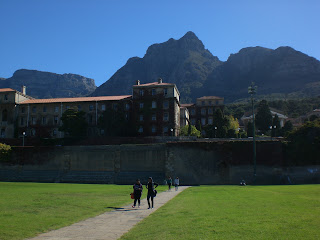All good things come to an end, or so they say. With seven days left in Cape Town, I think it is safe to say that this is the beginning of the end of my semester in South Africa. That is not to say that I will not one day return to this rainbow nation characterized, in my mind, by cash store names in white letters on bright red Coca-Cola backgrounds in the townships; vuvuzelas; rugby (and this year, the 2010 FIFA World Cup); overcrowded, often uninsured, yet efficient and economical taxis; Desmond Tutu and Nelson Mandela; ubuntu; a multiplicity of languages; a multiplicity of skin colours; university couples who are less shy than Americans to display their affection in public; the university students' fashionable dress (no sweatpants here!); the spontaneous Xhosa songs and dances that burst out while waiting for the bus, or riding the bus, or getting off the bus, or walking to class, or in the middle of the day at Equal Education, or...; British English spellings of words; British-style school uniforms (e.g. shirts and sweaters, which are entirely inappropriate when the temperatures are in the mid- upper-80s Fahrenheit; the overwhelming presence of meat in people's diets; mothers carrying babies and toddlers on their backs, holding them tight in place by tying a blanket or towel around them; the outfits that the Xhosa boys wear after returning from the ceremonies in which they become men; the ability to use the mountain as a geographical reference and permanent compass; the sunshine, the sunburn; the people who don't have homes; the number of people who tried telling me (a Christian) why I should believe in God; the white pastor preaching to a black congregation (save for me and Lin-Lin, who is Chinese); historically black primary and secondary schools whose pupil:teacher ratio is something like 40:1; the clear demarcations between poor townships and million-dollar homes; herders herding their goats and cattle across the N2; the seemingly carefree pace of life; a "holiday" nation; the cycle of poverty; the numerous legacies of apartheid; the hospitality of most of the South Africans I had the privilege of meeting; the prostitutes that stand on the street corners late at night; the man beating the woman on the side of the street, and feeling so helpless that I could do nothing but watch from inside the bus window; a dual sense of hopefulness and hopelessness; a future.
I'm not sure where this post was headed, but this is where it seems to end: a future. If there is one thing I have learned over the past four-and-a-half months, it is that everything Africa needs to succeed, She already has within and among her. Africa doesn't need our charity, our missionaries, or our approval. And my thoughts seem to end abruptly right here, right now. I suspect that the coming week will be a week of intense reflection, as well as mental preparation to close this chapter and open the next. Here's to the beginning of the end.
15 years ago














